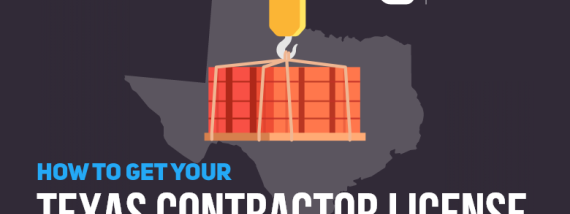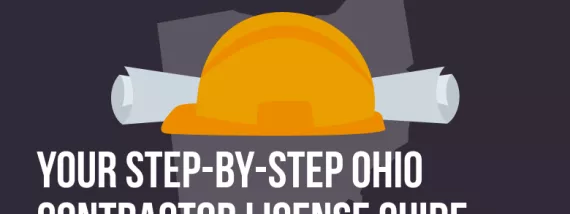The Full Virginia Contractor License Guide [2024 Update]

Interested in working in the construction industry in Virginia? Starting your contracting business in the state requires obtaining a Virginia contractor license.
The licensing process ensures that you comply with the legal framework, which guarantees a high degree of safety for the general public. More specifically, you should follow the rules set in Chapter 11 of Title 54.1 of the Code of Virginia.
There are three types of state licenses that you can choose from:
- VA Class C contractor license allows you to work on projects below $10,000 per contract and below a total of $150,000 within 12 months
- VA Class B contractor license gives you the right to execute projects below $120,000 per contract and below a total of $750,000 within 12 months
- VA Class A contractor license does not restrict the projects you can work on, thus it gives you the most possibilities
You will need to meet a range of requirements in order to obtain a state license. Additionally, you may also need to get a license from your city or municipality authority.
Let’s delve straight into the steps you need to undertake to obtain your VA general contractor license.
The Virginia Contractor License Requirements
The licensing authority is the Virginia Board of Contractors at the Department of Professional and Occupational Regulation. Each license type that it offers has different requirements in terms of experience and finances.
It’s crucial to choose the right type of license, as exceeding your contract amounts is a violation. Besides choosing the limit of contracts, you also need to select the specialty field you will be working in. You will be allowed to perform only jobs that fall in this category.
Business Entity Registration
You need to register a business entity in the state to start your contracting activities. You can find out the details via the Virginia Business One Stop website. You may also need a registration with the State Corporation Commission.
Trade Name
You can do business under an assumed name, but you will have to register it. For a corporation, LLC or limited partnership, you have to register the name with the State Corporation Commission. As for a partnership or sole proprietorship, the court in the jurisdiction in which you’re located has to register your name.
Financial Statement
For some license types, you will have to complete a financial statement. Class A applicants have to prove net worth of at least $45,000, while Class B applicants - of $15,000. Alternatively, you may be able to provide a surety bond instead. More information about this option is available in the section below.
Pre-licensing Course and State Examination
In order to get a Class A or B license, your Designated Employee will need to pass a Virginia contractor license exam. This is necessary to prove their knowledge and experience. In addition, a member of your Responsible Management or a Designated Employee (for Class A and Class B licenses only) has to complete a pre-license education course.
Complete the Virginia Contractors License Application
 Once you’ve obtained the necessary paperwork, it’s time to complete the Virginia contractors license application. Together with it, you have to submit the Contractor Experience Verification Form.
Once you’ve obtained the necessary paperwork, it’s time to complete the Virginia contractors license application. Together with it, you have to submit the Contractor Experience Verification Form.
Mail them to:
Commonwealth of Virginia
Department of Professional and Occupational Regulation
9960 Mayland Drive, Suite 400
Richmond, Virginia 23233-1485
You will receive an assessment of your application within 30 days. For further information about the licensing process, you can consult the guide of the Board.
License and Registration Fees
You need to cover the relevant license fees when submitting your application:
- Class A - $385.00
- Class B - $370.00
- Class C - $235.00
Provide a Surety Bond and Insurance
In order to obtain a Virginia state contractor license, you may have to post a surety bond and obtain insurance.
Worker’s Compensation Insurance
In case you’re hiring employees, you may have to get worker’s compensation insurance. You can consult the Virginia Workers’ Compensation Commission for more information.
Surety Bond
If you can’t meet the minimum net worth requirements, you can alternatively post a Virginia contractor license bond. The amount is $50,000. The bond should be provided in the official bond form.
You don’t need to pay the whole bond amount, however. You only have to cover a small fraction of it, which is your premium. If your finances are in good shape, you can expect rates between 0.75% and 5%.
Want to see the exact cost of your contractor license bond? Fill in the short form below!
How to verify your Virginia contractor license
You can check your license via the search option of the Department of Professional and Occupational Regulation. You can use license number, name, location, license type and board as search criteria.
License Renewal and Expiration
Your Virginia contractor license expires every two years. You have to renew it before the end date, so you can continue your operations. If you’ve obtained a bond, it should also be renewed accordingly.
Have further questions about obtaining your Virginia contractor license and bonding?
You can consult our experts by calling 877.514.5146.
- Fast and Secure Application
- Nationwide Coverage
- Approval in Minutes
- Money Back Guarantee
Recommended Articles
- Fast and Secure Application
- Nationwide Coverage
- Approval in Minutes
- Money Back Guarantee
- Image

- Image

- Image

Lance Surety Bond Associates, Inc. is a surety bond agency based out of southeastern Pennsylvania that is able to write all surety bond types in all 50 states. We are dedicated to servicing all of our customers' surety bonding needs throughout the country and guarantee competitive rates, timely responses, and unparalleled customer service.







